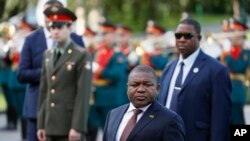The possible deaths in northern Mozambique of military contractors employed by a Russian firm are raising new questions about Russia’s security presence in Africa.
Five soldiers employed by the Wagner Group, a private military firm with connections to the Kremlin, and 20 soldiers in FADM, the Mozambique Defense Armed Forces, were killed in an ambush in Cabo Delgado Province’s Muidumbe district on Oct. 27, according to Carta de Moçambique, a local publication. Insurgents were said also to have burned two vehicles in the ambush.
VOA reached out to the Mozambique government for comment but did not receive a response. Russia denies its soldiers are in Mozambique, and Kremlin spokesperson Dmitry Peskov said earlier in October, “As far as Mozambique is concerned, there are no Russian soldiers there,” according to Russian state-owned media. Peskov added that his country is more focused on forging economic and security ties with African nations.
But the killings last week, counterterrorism experts warn, show the growing sophistication of insurgent groups operating in the region, and bring into question the effectiveness of Russian private military contractors assisting African governments.
For more than two years, several Islamic militant groups have carried out attacks in Mozambique’s Cabo Delgado region. The government has relied on Russian mercenaries to help contain the violence and protect vast reserves of natural gas.
“We are seeing them now more in a guerrilla type of war — retreat, attack, retreat, attack — creating the surprise element,” Jasmine Opperman, a researcher and terrorism expert in South Africa, told VOA. “And the Russians have been caught unaware of this level of sophistication and weapons available to the insurgents."
Details contested
DefenceWeb, a South African security publication, reported that four of the Russian soldiers shot during the ambush were later decapitated. The fifth soldier died of wounds in a hospital, according to the site.
But experts on the region are urging skepticism of information circulating online and via social media, including photos of dismembered bodies.
“If you go into the WhatsApp, and when you look at the photographs, they are all fake, because most of the insurgents, when they do attack, they are dressed with Mozambique army or police special forces equipment,” said Yussuf Adam, an associate professor of Contemporary History at the University of Eduardo Mondlane in Maputo, Mozambique.
Adam added that the weaponry in some of the pictures shared was questionable. Those photographed are holding 12-gauge shotguns, but insurgents in the region more commonly carry AK-47s.
The Wagner Group
According to local media reports, the Russian soldiers killed in late October were employed by the Wagner Group, a private military company owned by Yevgeny Prigozhin, a Russian oligarch with close ties to President Vladimir Putin.
“Prigozhin’s Wagner Group is almost like an official arm of state policy in Russia. I mean, obviously it’s not officially recognized, and yet its services can be a proxy for the Kremlin,” Michael Carpenter, senior director of the Penn Biden Center for Diplomacy and Global Engagement, told VOA’s Russian service.
Carpenter said the arrangement is similar to “privateers” operating hundreds of years ago — state-sanctioned mercenaries or pirates who helped carry out the foreign policies of countries like England, Spain and Portugal.
“When Prigozhin goes in and provides consulting services, either personal protection services to a dictator or election support services or mercenaries who can be helpful in guarding certain strategic assets in a given country, he paves the way for other Russian corporations … to do business in those countries,” Carpenter said.
Opperman said, based on her research, Wagner does nothing without the approval of the Kremlin. “I make no distinction between Russian soldiers and the Wagner Group — the way they cooperate, at this point in time,” she told VOA.
Military cooperation expansion
Eugene Chausovsky, senior analyst at Stratfor, an intelligence analysis company, told VOA that Russia aims to support regimes under threat internally and to some degree isolated on the world stage. He calls it the “Syria model.”
“It comes in and supports a regime that’s been coming under threat from opposition forces,” he said. “And there’s been a lot of openings for Russia to do so in Africa.”
Moscow has pursued versions of this strategy in the Central African Republic, Mozambique and Sudan.
“Russia is looking to portray itself as a great power globally, and it is recognized that one of the places it has to do that is Africa,” said Judd Devermont, the director of the Africa Program at the Center for Strategic and International Studies, a think tank focusing on foreign policy.
“They need permissive markets to sell their energy and security deals. And as time went on they also started to see Africa as a place where they could make points at the U.S. to show that if the U.S. is not engaged, Russia is,” Devermont said. “And so we have seen them sign military deals and increase their economic engagement.”
This story originated in VOA’s Africa division and Russian service. Valeria Jegisman and Danila Galperovich contributed reporting.






